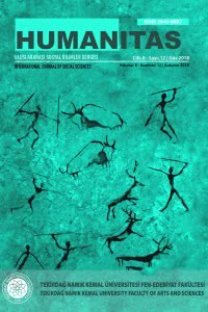Kuzey Amerikalı Şair Richard Fein’ın Yidiş Benliği
Bu çalışmada, Kuzey Amerikalı şair Richard Fein’ın At the Turkish Bath [Türk Hamamı’nda] adlı eserindeki şiirleri incelemeyi amaçlıyorum. Analizlerimde, bilişsel şiirbilimsel bir bakış açısı izlemeyi amaçlıyorum, çünkü İsrailli dilbilimci ve bilişsel bilimci Reuven Tsur’un “Bilişsel Şiirbilim” kuramı (1992), metaforlar gibi anlam karmaşalarının çözüldüğü ve şiirlerin doğru anlaşılmasını sağlayan bilişsel işlev zorunluluklarına bağlı oan bilişsel süreçlere dayanır. Bu kitap Yidiş kültürünün güzel bir temsilcisidir. Ben şairin Yahudi ve Yidiş kimliğini kullandığı metaforlar ve metonimiler gibi bilişsel kelime sanatları aracılığıyla keşfetmek niyetindeyim. Şair bazı Yidiş kelimeler kullanır ve İngilizce şiirine bazı Yahudi kültürüne özgü öğeler katar. Kısacası, şairin kişiliğinin oluşum ve tasvirini At the Turkish Bath [Türk Hamamı’nda] adlı eserinde her ikisi de şairin kimlik ve kişiliğini Gestalt-türü bir yaklaşımla anlamak için en iyi estetik kaynak olan kelime sanatlarıyla ve bunların bilişsel şiirbilimdeki sınıflandırmalarına göre yorumlarından keşfetmeyi amaçlıyorum. Ayrıca, Richard Fein’ın Yidiş ve Kuzey Amerikalı kimliklerini şairin “My World of Yiddish” [“Benim Yidiş Dünyam”] ve “The Yiddish Poet Yankev Glatshteyn Visits Me in the Coffee Shop” [“Bir Kahvecide Yidiş Şair Yankev Glatshteyn Beni Ziyaret Eder”] başlıklı iki şiirinin bilişsel şiirbilimsel analizleri ile keşfederek, Kuzey Amerika Yahudi kültürü hakkında konuşacağım.
Anahtar Kelimeler:
Yidiş, Bilişsel Şiirbilim, Richard Fein, Amerikan Yahudi Edebiyatı
The Yiddish Self of the North American Poet Richard Fein
In this study, I aim to analyze poems of the North American poet Richard Fein that he collected in his book entitled At the Turkish Bath. In my analyses, I intend to follow a cognitive poetic point of view, as the theory of “Cognitive Poetics” (1992) of the Israeli linguist and cognitive scientist Reuven Tsur, is based on cognitive processes, through which one solves the semantic ambiguities, such as metaphors, and the cognitive obligations, which lead to the correct interpretation of the poetry. This book is a good presenter of the Yiddish culture. I intend to discover the Jewish and Yiddish self of the poet through the cognitive word arts, such as metaphors, and metonymies that he uses. The poet uses some Yiddish words and inserts some Jewish elements into his poetry in English. Briefly, I aim to discover the formation and the description of the poet’s Yiddish self in his book At the Turkish Bath through the interpretation of the word arts, and their classification in cognitive poetics, both of which are the best aesthetic sources for understanding the identity and the self of the poet from a Gestalt-like perspective. Besides, I am going to talk about the North American Jewish culture, discovering the poet’s Yiddish and North American identities via the cognitive poetic analyses of the two poems of Richard Fein, entitled “My World of Yiddish” and “The Yiddish Poet Yankev Glatshteyn Visits Me in the Coffee Shop.”
Keywords:
Yiddish, Cognitive Poetics, Richard Fein, American Jewish Literature,
___
- Asheville Poetry Review. (n.d.). Richard Fein. Retrieved from http://www.ashevillepoetryreview.com/2003/contributors/richard-fein.
- Fein, R. J. (1994). At the Turkish Bath. Towson, MD: Chestnut Hills Press.
- Frank Sinatra: Timeline. (n.d.). Retrieved from http://www.sinatra.com/timeline.
- Jalic Inc, The Literature Network. 2000-2019. William Butler Yeats. Retrieved from http://www.online-literature.com/yeats/.
- Poetry Foundation. (2019). Marianne Moore. Retrieved from https://www.poetryfoundation.org/poets/marianne-moore.
- Remember Jewish Chełm - Genealogy Group. (n.d.). Retrieved from http://chelm.freeyellow.com/chelm.html.
- The Estates of Mercer K. Ellington and Edward K. “Duke” Ellington. (2008). The Official Site of the Jazz Legend: Duke Ellington: Duke Ellington Biography. Retrieved from http://www.dukeellington.com/ellingtonbio.html.
- Tsur, R. (1992). Toward a Theory of Cognitive Poetics. Amsterdam, London, New York & Tokyo: North-Holland.
- Words without Borders. (n.d.). Contributor: Yankev Glatshteyn. Retrieved from https://www.wordswithoutborders.org/contributor/yankev-glatshteyn.
- ISSN: 2147-088X
- Yayın Aralığı: Yılda 2 Sayı
- Başlangıç: 2013
- Yayıncı: Namık Kemal Üniversitesi
Sayıdaki Diğer Makaleler
Louis De Bernières’in Kanatsız Kuşlar Romanında Sosyal Kimlik Oluşumu
Batılı Paradigmaların Dönüştürücülüğü Bağlamında Tanzimat Şiirinde Deist Etkiler
Wittgenstein ve Foucault'da Gramer ve İktidar
Monomitik Kurmaca Söylem Olarak Oluşum Romanı: Büyük Umutlar'da Kimlik Oluşumu ve Öne Sürümü
Çağdaş Amerikan Şiirinde Irak Savaşı
Kuzey Amerikalı Şair Richard Fein’ın Yidiş Benliği
